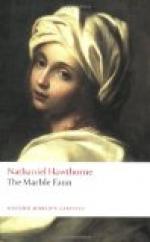By this interview, the sculptor had learned nothing in reference to Hilda; but he understood that he was to adhere to the instructions already received, and await a solution of the mystery in some mode that he could not yet anticipate. Passing his hands over his eyes, and looking about him,—for the event just described had made the scene even more dreamlike than before,—he now found himself approaching that broad piazza bordering on the Corso, which has for its central object the sculptured column of Antoninus. It was not far from this vicinity that Miriam had bid him wait. Struggling onward as fast as the tide of merrymakers, setting strong against him, would permit, he was now beyond the Palazzo Colonna, and began to count the houses. The fifth was a palace, with a long front upon the Corso, and of stately height, but somewhat grim with age.
Over its arched and pillared entrance there was a balcony, richly hung with tapestry and damask, and tenanted, for the time, by a gentleman of venerable aspect and a group of ladies. The white hair and whiskers of the former, and the winter roses in his cheeks, had an English look; the ladies, too, showed a fair-haired Saxon bloom, and seemed to taste the mirth of the Carnival with the freshness of spectators to whom the scene was new. All the party, the old gentleman with grave earnestness, as if he were defending a rampart, and his young companions with exuberance of frolic, showered confetti inexhaustibly upon the passers-by.
In the rear of the balcony, a broad-brimmed, ecclesiastical beaver was visible. An abbate, probably an acquaintance and cicerone of the English family, was sitting there, and enjoying the scene, though partially withdrawn from view, as the decorum for his order dictated.
There seemed no better nor other course for Kenyon than to keep watch at this appointed spot, waiting for whatever should happen next. Clasping his arm round a lamp-post, to prevent being carried away by the turbulent stream of wayfarers, he scrutinized every face, with the idea that some one of them might meet his eyes with a glance of intelligence. He looked at each mask,—harlequin, ape, bulbous-headed monster, or anything that was absurdest,—not knowing but that the messenger might come, even in such fantastic guise. Or perhaps one of those quaint figures, in the stately ruff, the cloak, tunic, and trunk-hose of three centuries ago, might bring him tidings of Hilda, out of that long-past age. At times his disquietude took a hopeful aspect; and he fancied that Hilda might come by, her own sweet self, in some shy disguise which the instinct Of his love would be sure to penetrate. Or, she might be borne past on a triumphal car, like the one just now approaching, its slow-moving wheels encircled and spoked with foliage, and drawn by horses, that were harnessed and wreathed with flowers. Being, at best, so far beyond the bounds of reasonable conjecture, he might anticipate the wildest event, or find either his hopes or fears disappointed in what appeared most probable.




